HI6026 - Auditor's Public Interest Responsibilities and Quality
VerifiedAdded on 2023/04/22
|19
|4670
|350
Report
AI Summary
This report analyzes the impact of material misstatements on an ASX-listed company, BHP Billiton, and examines auditor's public interest responsibilities under APES 110, including whistleblowing and independence. It draws lessons from the Enron scandal, emphasizing the need for enhanced auditing standards, independent oversight, and strong auditor-audit committee relationships. The report further discusses the importance of tight internal controls and adherence to international regulations in maintaining audit quality. The analysis covers stakeholder impact, ethical considerations, and practical steps for auditors to improve their practices and prevent future financial collapses.
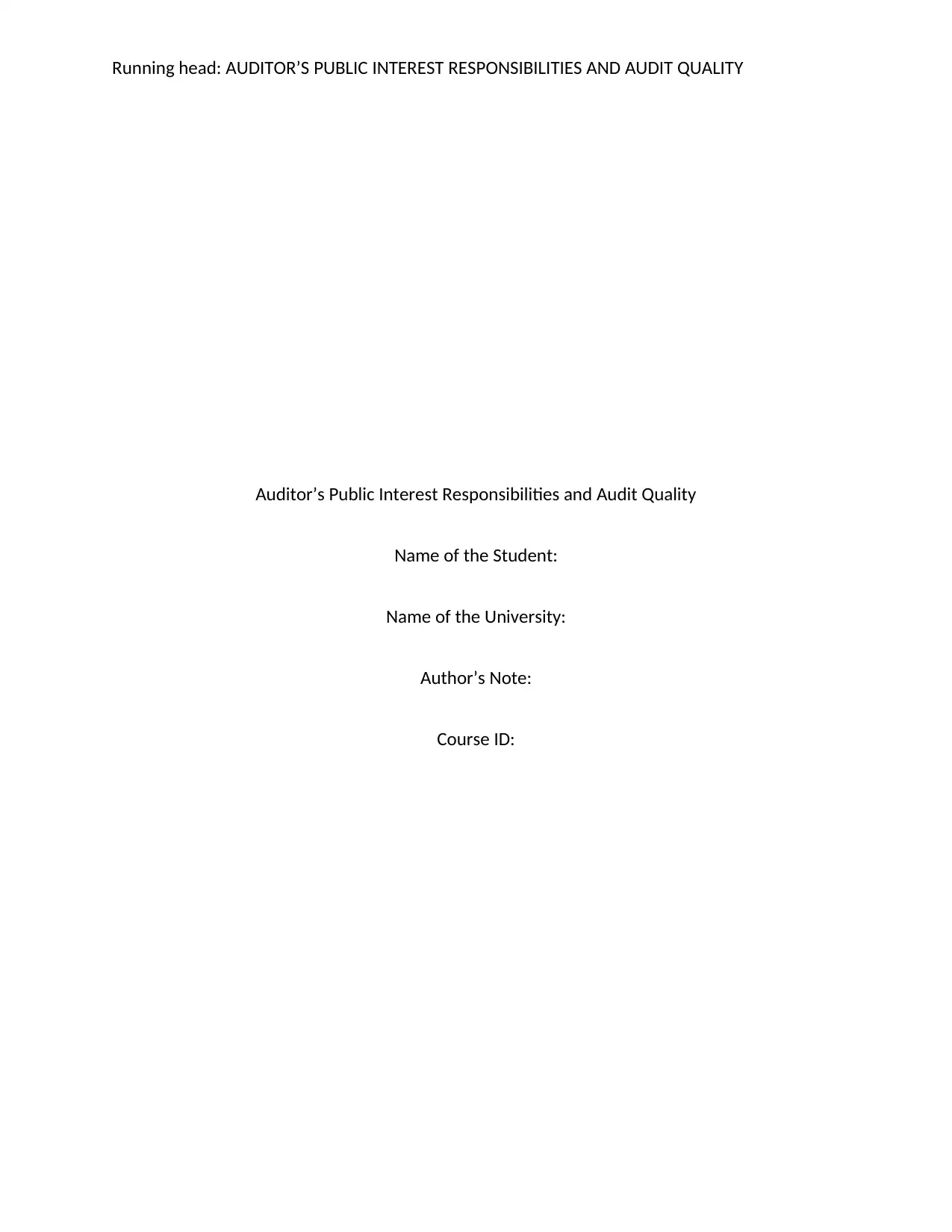
Running head: AUDITOR’S PUBLIC INTEREST RESPONSIBILITIES AND AUDIT QUALITY
Auditor’s Public Interest Responsibilities and Audit Quality
Name of the Student:
Name of the University:
Author’s Note:
Course ID:
Auditor’s Public Interest Responsibilities and Audit Quality
Name of the Student:
Name of the University:
Author’s Note:
Course ID:
Paraphrase This Document
Need a fresh take? Get an instant paraphrase of this document with our AI Paraphraser
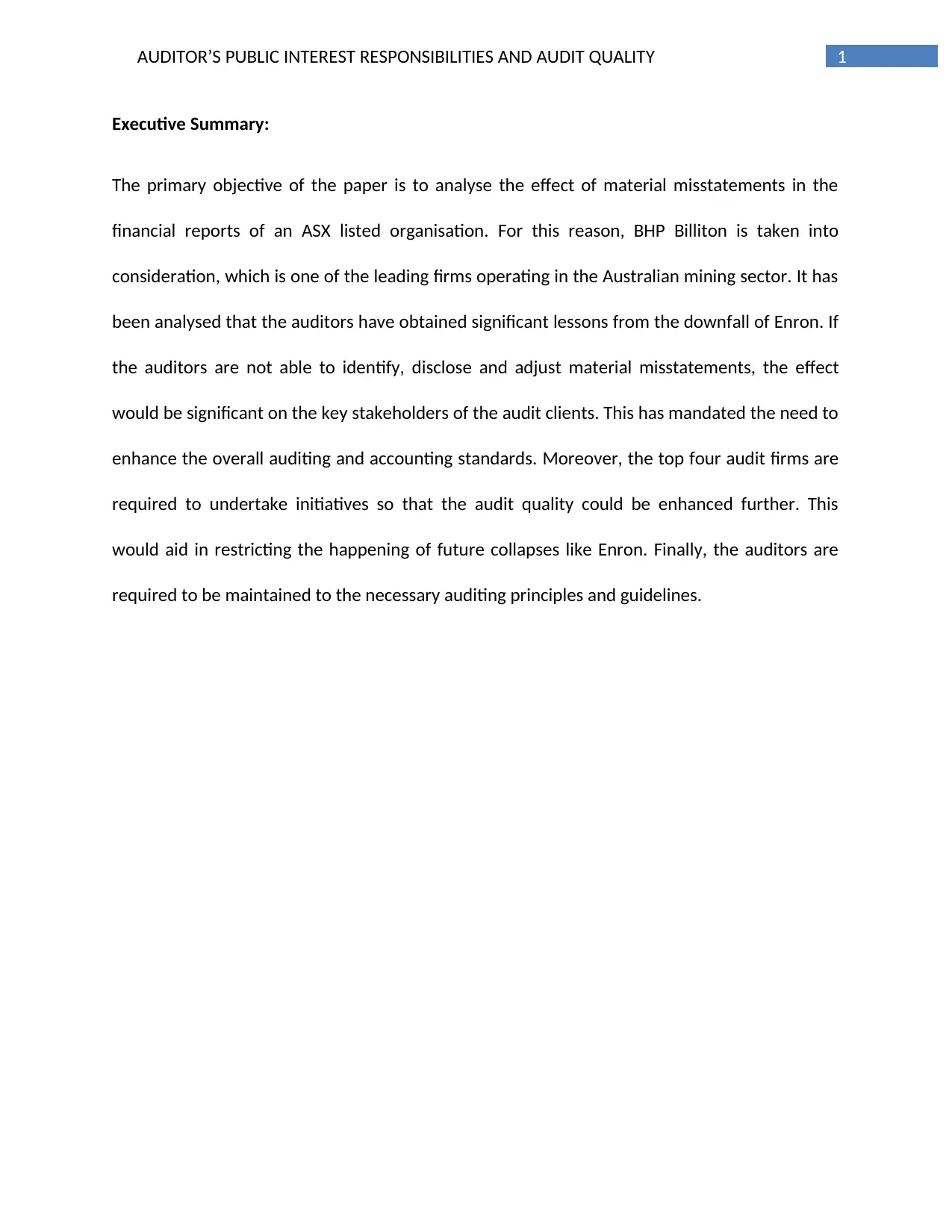
1AUDITOR’S PUBLIC INTEREST RESPONSIBILITIES AND AUDIT QUALITY
Executive Summary:
The primary objective of the paper is to analyse the effect of material misstatements in the
financial reports of an ASX listed organisation. For this reason, BHP Billiton is taken into
consideration, which is one of the leading firms operating in the Australian mining sector. It has
been analysed that the auditors have obtained significant lessons from the downfall of Enron. If
the auditors are not able to identify, disclose and adjust material misstatements, the effect
would be significant on the key stakeholders of the audit clients. This has mandated the need to
enhance the overall auditing and accounting standards. Moreover, the top four audit firms are
required to undertake initiatives so that the audit quality could be enhanced further. This
would aid in restricting the happening of future collapses like Enron. Finally, the auditors are
required to be maintained to the necessary auditing principles and guidelines.
Executive Summary:
The primary objective of the paper is to analyse the effect of material misstatements in the
financial reports of an ASX listed organisation. For this reason, BHP Billiton is taken into
consideration, which is one of the leading firms operating in the Australian mining sector. It has
been analysed that the auditors have obtained significant lessons from the downfall of Enron. If
the auditors are not able to identify, disclose and adjust material misstatements, the effect
would be significant on the key stakeholders of the audit clients. This has mandated the need to
enhance the overall auditing and accounting standards. Moreover, the top four audit firms are
required to undertake initiatives so that the audit quality could be enhanced further. This
would aid in restricting the happening of future collapses like Enron. Finally, the auditors are
required to be maintained to the necessary auditing principles and guidelines.
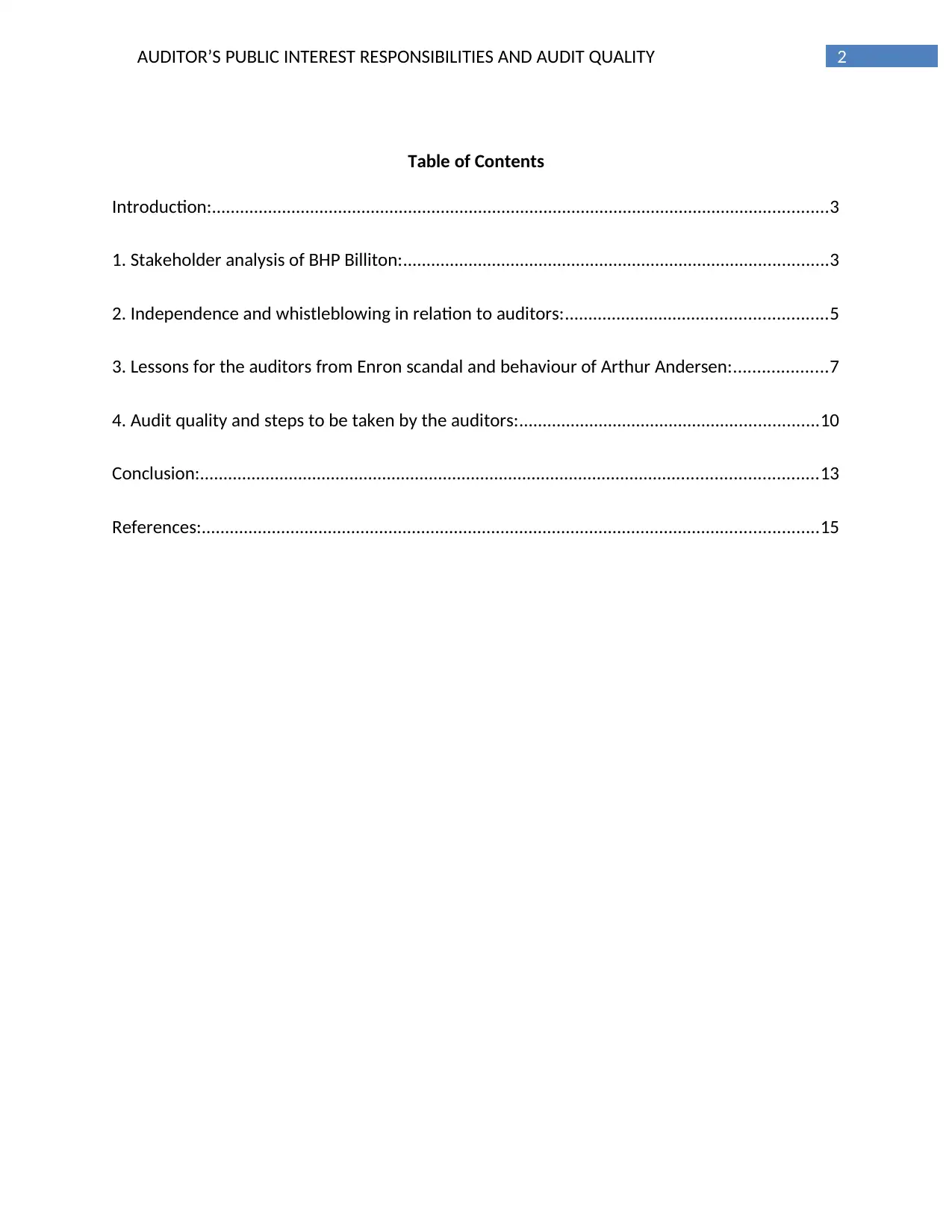
2AUDITOR’S PUBLIC INTEREST RESPONSIBILITIES AND AUDIT QUALITY
Table of Contents
Introduction:....................................................................................................................................3
1. Stakeholder analysis of BHP Billiton:...........................................................................................3
2. Independence and whistleblowing in relation to auditors:........................................................5
3. Lessons for the auditors from Enron scandal and behaviour of Arthur Andersen:....................7
4. Audit quality and steps to be taken by the auditors:................................................................10
Conclusion:....................................................................................................................................13
References:....................................................................................................................................15
Table of Contents
Introduction:....................................................................................................................................3
1. Stakeholder analysis of BHP Billiton:...........................................................................................3
2. Independence and whistleblowing in relation to auditors:........................................................5
3. Lessons for the auditors from Enron scandal and behaviour of Arthur Andersen:....................7
4. Audit quality and steps to be taken by the auditors:................................................................10
Conclusion:....................................................................................................................................13
References:....................................................................................................................................15
⊘ This is a preview!⊘
Do you want full access?
Subscribe today to unlock all pages.

Trusted by 1+ million students worldwide
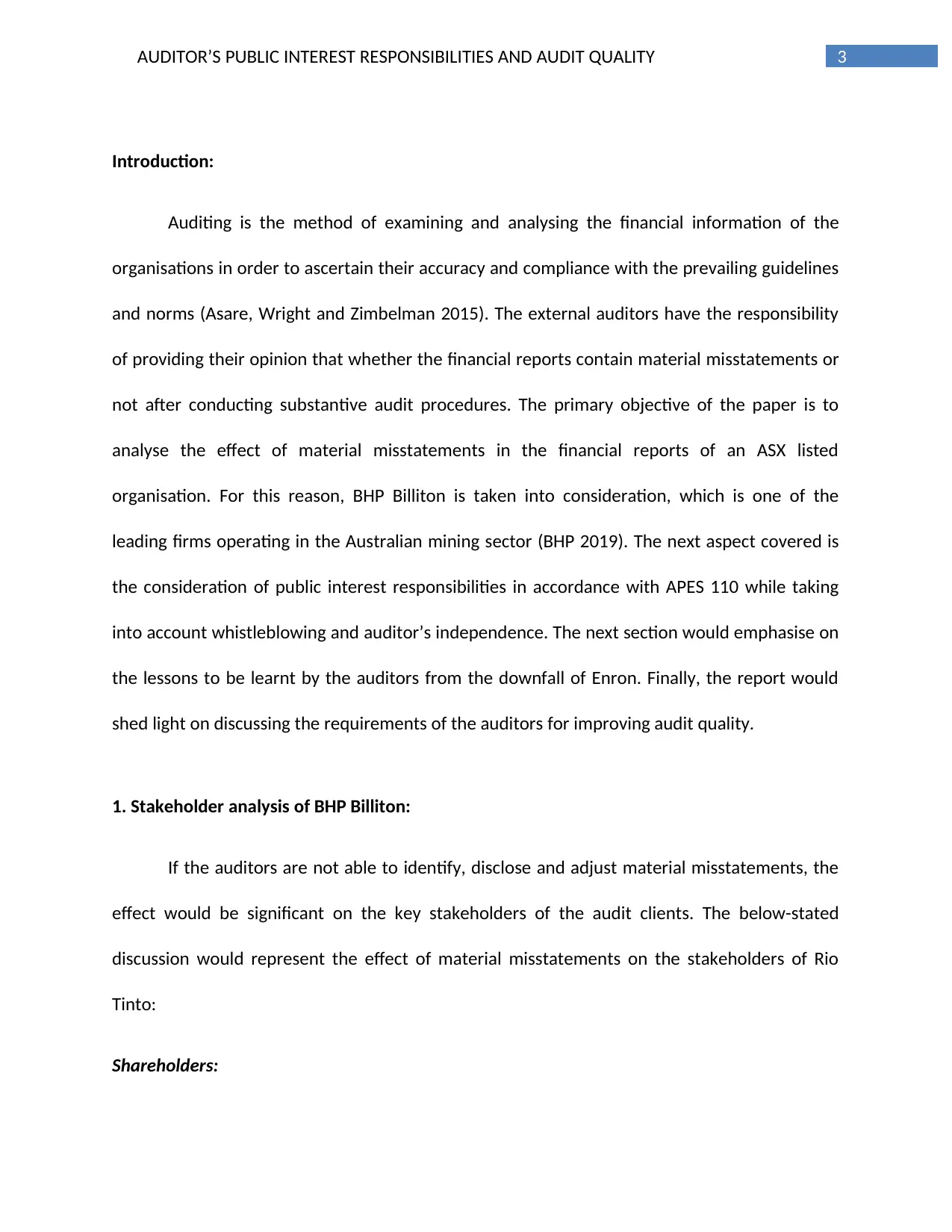
3AUDITOR’S PUBLIC INTEREST RESPONSIBILITIES AND AUDIT QUALITY
Introduction:
Auditing is the method of examining and analysing the financial information of the
organisations in order to ascertain their accuracy and compliance with the prevailing guidelines
and norms (Asare, Wright and Zimbelman 2015). The external auditors have the responsibility
of providing their opinion that whether the financial reports contain material misstatements or
not after conducting substantive audit procedures. The primary objective of the paper is to
analyse the effect of material misstatements in the financial reports of an ASX listed
organisation. For this reason, BHP Billiton is taken into consideration, which is one of the
leading firms operating in the Australian mining sector (BHP 2019). The next aspect covered is
the consideration of public interest responsibilities in accordance with APES 110 while taking
into account whistleblowing and auditor’s independence. The next section would emphasise on
the lessons to be learnt by the auditors from the downfall of Enron. Finally, the report would
shed light on discussing the requirements of the auditors for improving audit quality.
1. Stakeholder analysis of BHP Billiton:
If the auditors are not able to identify, disclose and adjust material misstatements, the
effect would be significant on the key stakeholders of the audit clients. The below-stated
discussion would represent the effect of material misstatements on the stakeholders of Rio
Tinto:
Shareholders:
Introduction:
Auditing is the method of examining and analysing the financial information of the
organisations in order to ascertain their accuracy and compliance with the prevailing guidelines
and norms (Asare, Wright and Zimbelman 2015). The external auditors have the responsibility
of providing their opinion that whether the financial reports contain material misstatements or
not after conducting substantive audit procedures. The primary objective of the paper is to
analyse the effect of material misstatements in the financial reports of an ASX listed
organisation. For this reason, BHP Billiton is taken into consideration, which is one of the
leading firms operating in the Australian mining sector (BHP 2019). The next aspect covered is
the consideration of public interest responsibilities in accordance with APES 110 while taking
into account whistleblowing and auditor’s independence. The next section would emphasise on
the lessons to be learnt by the auditors from the downfall of Enron. Finally, the report would
shed light on discussing the requirements of the auditors for improving audit quality.
1. Stakeholder analysis of BHP Billiton:
If the auditors are not able to identify, disclose and adjust material misstatements, the
effect would be significant on the key stakeholders of the audit clients. The below-stated
discussion would represent the effect of material misstatements on the stakeholders of Rio
Tinto:
Shareholders:
Paraphrase This Document
Need a fresh take? Get an instant paraphrase of this document with our AI Paraphraser
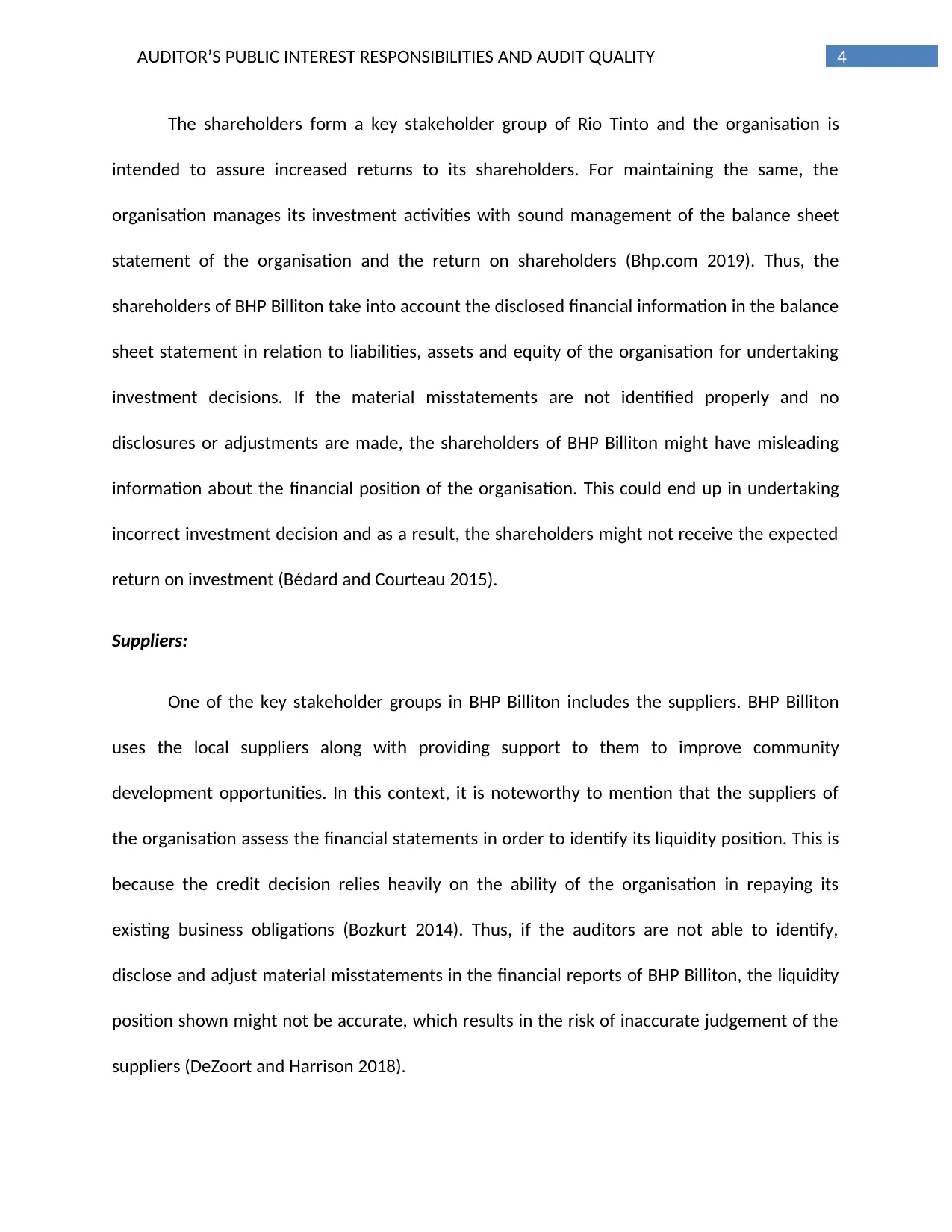
4AUDITOR’S PUBLIC INTEREST RESPONSIBILITIES AND AUDIT QUALITY
The shareholders form a key stakeholder group of Rio Tinto and the organisation is
intended to assure increased returns to its shareholders. For maintaining the same, the
organisation manages its investment activities with sound management of the balance sheet
statement of the organisation and the return on shareholders (Bhp.com 2019). Thus, the
shareholders of BHP Billiton take into account the disclosed financial information in the balance
sheet statement in relation to liabilities, assets and equity of the organisation for undertaking
investment decisions. If the material misstatements are not identified properly and no
disclosures or adjustments are made, the shareholders of BHP Billiton might have misleading
information about the financial position of the organisation. This could end up in undertaking
incorrect investment decision and as a result, the shareholders might not receive the expected
return on investment (Bédard and Courteau 2015).
Suppliers:
One of the key stakeholder groups in BHP Billiton includes the suppliers. BHP Billiton
uses the local suppliers along with providing support to them to improve community
development opportunities. In this context, it is noteworthy to mention that the suppliers of
the organisation assess the financial statements in order to identify its liquidity position. This is
because the credit decision relies heavily on the ability of the organisation in repaying its
existing business obligations (Bozkurt 2014). Thus, if the auditors are not able to identify,
disclose and adjust material misstatements in the financial reports of BHP Billiton, the liquidity
position shown might not be accurate, which results in the risk of inaccurate judgement of the
suppliers (DeZoort and Harrison 2018).
The shareholders form a key stakeholder group of Rio Tinto and the organisation is
intended to assure increased returns to its shareholders. For maintaining the same, the
organisation manages its investment activities with sound management of the balance sheet
statement of the organisation and the return on shareholders (Bhp.com 2019). Thus, the
shareholders of BHP Billiton take into account the disclosed financial information in the balance
sheet statement in relation to liabilities, assets and equity of the organisation for undertaking
investment decisions. If the material misstatements are not identified properly and no
disclosures or adjustments are made, the shareholders of BHP Billiton might have misleading
information about the financial position of the organisation. This could end up in undertaking
incorrect investment decision and as a result, the shareholders might not receive the expected
return on investment (Bédard and Courteau 2015).
Suppliers:
One of the key stakeholder groups in BHP Billiton includes the suppliers. BHP Billiton
uses the local suppliers along with providing support to them to improve community
development opportunities. In this context, it is noteworthy to mention that the suppliers of
the organisation assess the financial statements in order to identify its liquidity position. This is
because the credit decision relies heavily on the ability of the organisation in repaying its
existing business obligations (Bozkurt 2014). Thus, if the auditors are not able to identify,
disclose and adjust material misstatements in the financial reports of BHP Billiton, the liquidity
position shown might not be accurate, which results in the risk of inaccurate judgement of the
suppliers (DeZoort and Harrison 2018).
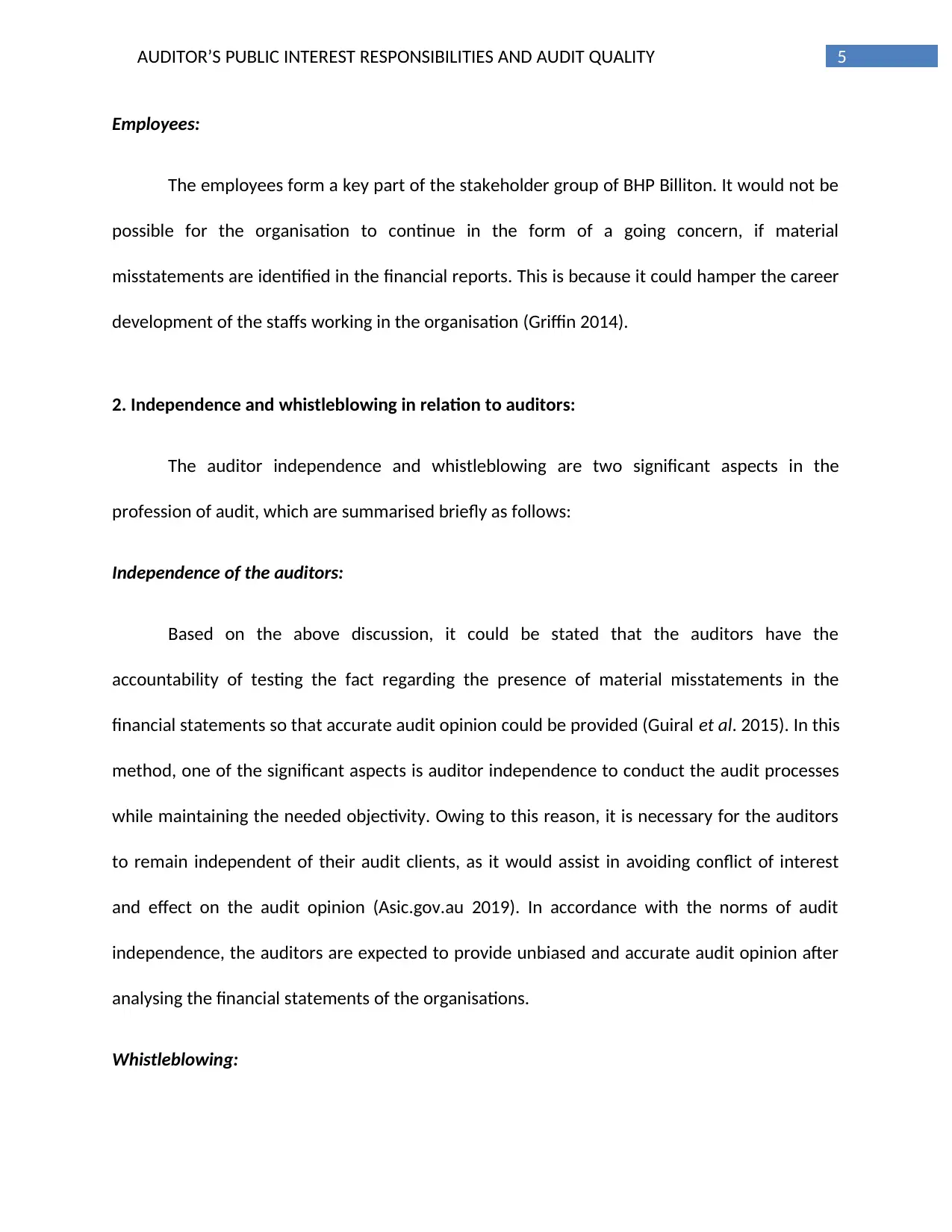
5AUDITOR’S PUBLIC INTEREST RESPONSIBILITIES AND AUDIT QUALITY
Employees:
The employees form a key part of the stakeholder group of BHP Billiton. It would not be
possible for the organisation to continue in the form of a going concern, if material
misstatements are identified in the financial reports. This is because it could hamper the career
development of the staffs working in the organisation (Griffin 2014).
2. Independence and whistleblowing in relation to auditors:
The auditor independence and whistleblowing are two significant aspects in the
profession of audit, which are summarised briefly as follows:
Independence of the auditors:
Based on the above discussion, it could be stated that the auditors have the
accountability of testing the fact regarding the presence of material misstatements in the
financial statements so that accurate audit opinion could be provided (Guiral et al. 2015). In this
method, one of the significant aspects is auditor independence to conduct the audit processes
while maintaining the needed objectivity. Owing to this reason, it is necessary for the auditors
to remain independent of their audit clients, as it would assist in avoiding conflict of interest
and effect on the audit opinion (Asic.gov.au 2019). In accordance with the norms of audit
independence, the auditors are expected to provide unbiased and accurate audit opinion after
analysing the financial statements of the organisations.
Whistleblowing:
Employees:
The employees form a key part of the stakeholder group of BHP Billiton. It would not be
possible for the organisation to continue in the form of a going concern, if material
misstatements are identified in the financial reports. This is because it could hamper the career
development of the staffs working in the organisation (Griffin 2014).
2. Independence and whistleblowing in relation to auditors:
The auditor independence and whistleblowing are two significant aspects in the
profession of audit, which are summarised briefly as follows:
Independence of the auditors:
Based on the above discussion, it could be stated that the auditors have the
accountability of testing the fact regarding the presence of material misstatements in the
financial statements so that accurate audit opinion could be provided (Guiral et al. 2015). In this
method, one of the significant aspects is auditor independence to conduct the audit processes
while maintaining the needed objectivity. Owing to this reason, it is necessary for the auditors
to remain independent of their audit clients, as it would assist in avoiding conflict of interest
and effect on the audit opinion (Asic.gov.au 2019). In accordance with the norms of audit
independence, the auditors are expected to provide unbiased and accurate audit opinion after
analysing the financial statements of the organisations.
Whistleblowing:
⊘ This is a preview!⊘
Do you want full access?
Subscribe today to unlock all pages.

Trusted by 1+ million students worldwide
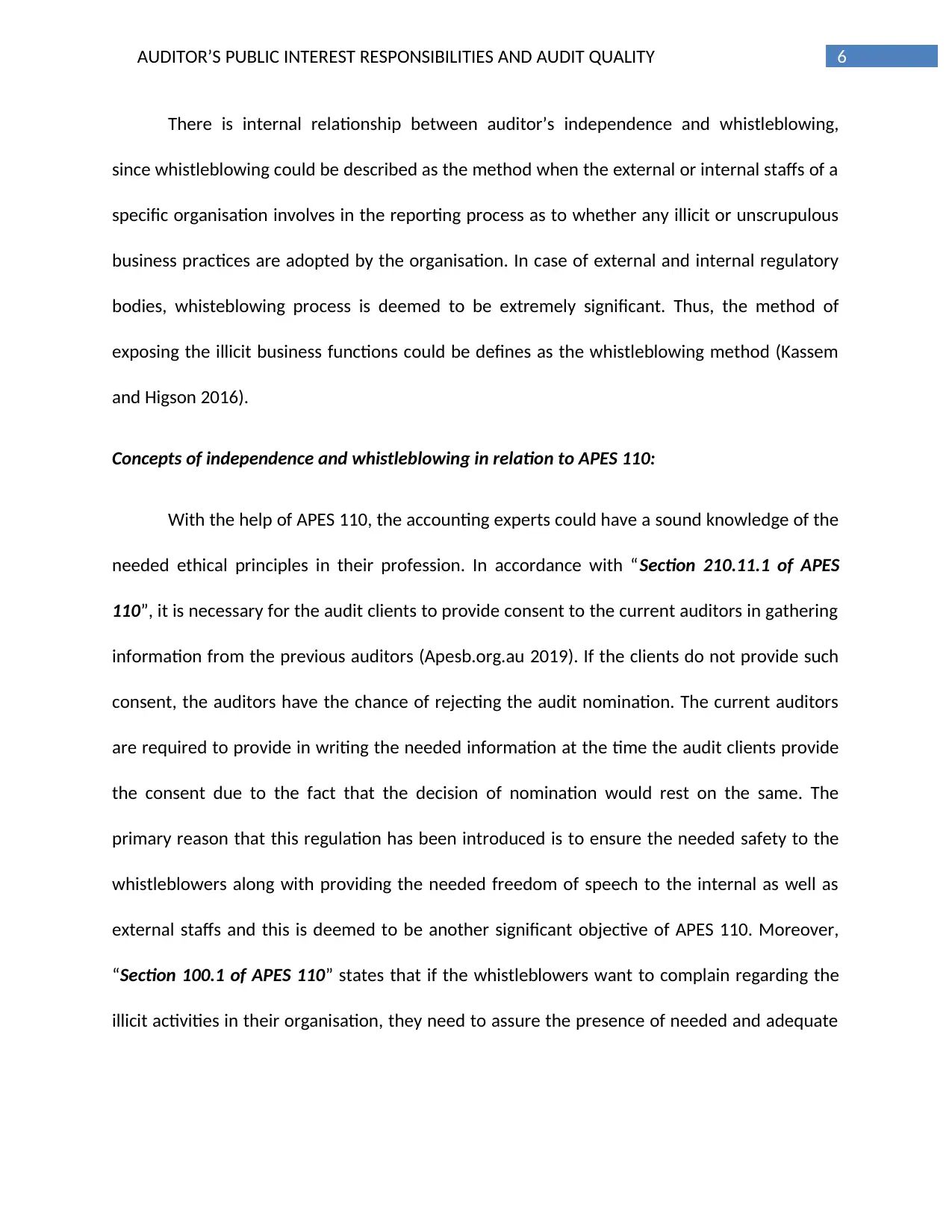
6AUDITOR’S PUBLIC INTEREST RESPONSIBILITIES AND AUDIT QUALITY
There is internal relationship between auditor’s independence and whistleblowing,
since whistleblowing could be described as the method when the external or internal staffs of a
specific organisation involves in the reporting process as to whether any illicit or unscrupulous
business practices are adopted by the organisation. In case of external and internal regulatory
bodies, whisteblowing process is deemed to be extremely significant. Thus, the method of
exposing the illicit business functions could be defines as the whistleblowing method (Kassem
and Higson 2016).
Concepts of independence and whistleblowing in relation to APES 110:
With the help of APES 110, the accounting experts could have a sound knowledge of the
needed ethical principles in their profession. In accordance with “Section 210.11.1 of APES
110”, it is necessary for the audit clients to provide consent to the current auditors in gathering
information from the previous auditors (Apesb.org.au 2019). If the clients do not provide such
consent, the auditors have the chance of rejecting the audit nomination. The current auditors
are required to provide in writing the needed information at the time the audit clients provide
the consent due to the fact that the decision of nomination would rest on the same. The
primary reason that this regulation has been introduced is to ensure the needed safety to the
whistleblowers along with providing the needed freedom of speech to the internal as well as
external staffs and this is deemed to be another significant objective of APES 110. Moreover,
“Section 100.1 of APES 110” states that if the whistleblowers want to complain regarding the
illicit activities in their organisation, they need to assure the presence of needed and adequate
There is internal relationship between auditor’s independence and whistleblowing,
since whistleblowing could be described as the method when the external or internal staffs of a
specific organisation involves in the reporting process as to whether any illicit or unscrupulous
business practices are adopted by the organisation. In case of external and internal regulatory
bodies, whisteblowing process is deemed to be extremely significant. Thus, the method of
exposing the illicit business functions could be defines as the whistleblowing method (Kassem
and Higson 2016).
Concepts of independence and whistleblowing in relation to APES 110:
With the help of APES 110, the accounting experts could have a sound knowledge of the
needed ethical principles in their profession. In accordance with “Section 210.11.1 of APES
110”, it is necessary for the audit clients to provide consent to the current auditors in gathering
information from the previous auditors (Apesb.org.au 2019). If the clients do not provide such
consent, the auditors have the chance of rejecting the audit nomination. The current auditors
are required to provide in writing the needed information at the time the audit clients provide
the consent due to the fact that the decision of nomination would rest on the same. The
primary reason that this regulation has been introduced is to ensure the needed safety to the
whistleblowers along with providing the needed freedom of speech to the internal as well as
external staffs and this is deemed to be another significant objective of APES 110. Moreover,
“Section 100.1 of APES 110” states that if the whistleblowers want to complain regarding the
illicit activities in their organisation, they need to assure the presence of needed and adequate
Paraphrase This Document
Need a fresh take? Get an instant paraphrase of this document with our AI Paraphraser
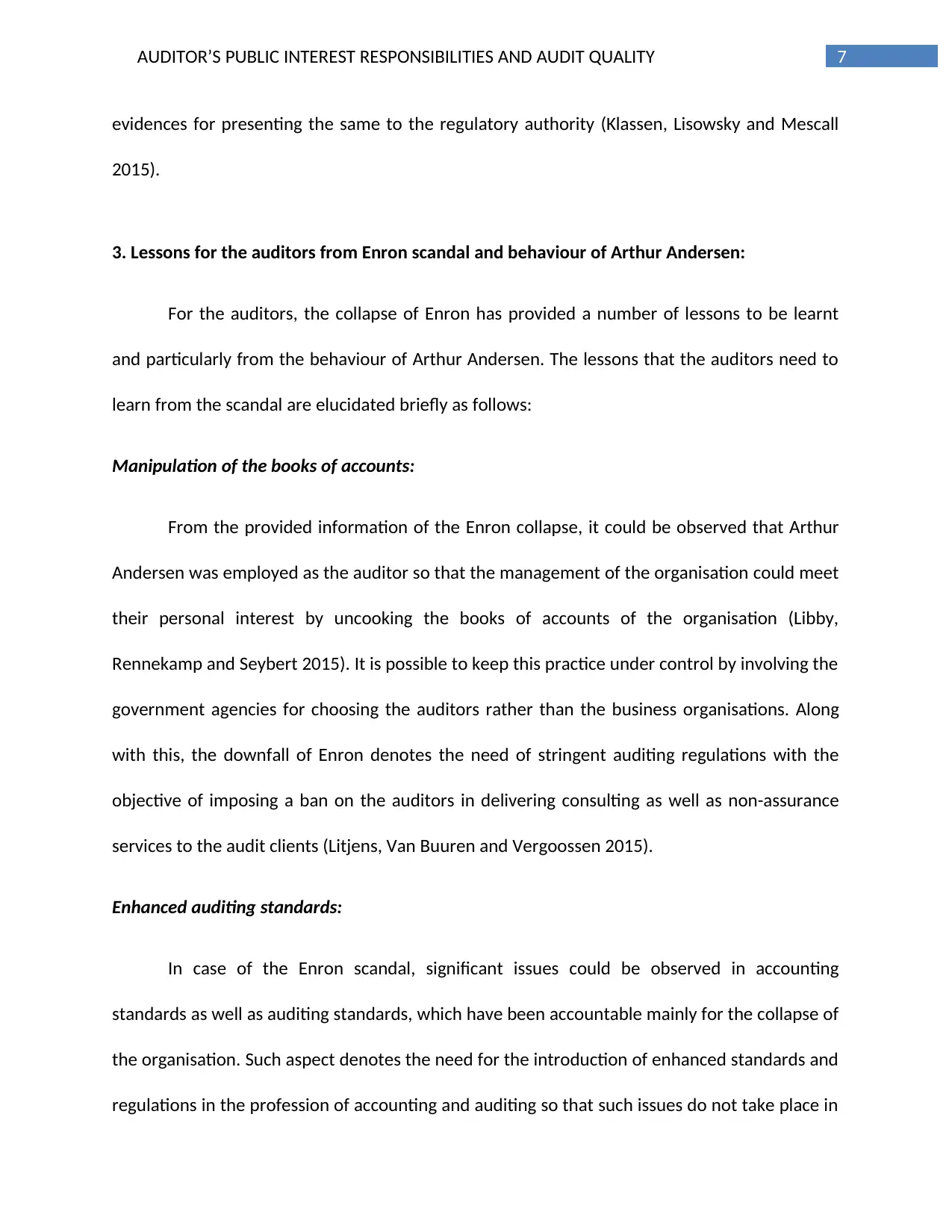
7AUDITOR’S PUBLIC INTEREST RESPONSIBILITIES AND AUDIT QUALITY
evidences for presenting the same to the regulatory authority (Klassen, Lisowsky and Mescall
2015).
3. Lessons for the auditors from Enron scandal and behaviour of Arthur Andersen:
For the auditors, the collapse of Enron has provided a number of lessons to be learnt
and particularly from the behaviour of Arthur Andersen. The lessons that the auditors need to
learn from the scandal are elucidated briefly as follows:
Manipulation of the books of accounts:
From the provided information of the Enron collapse, it could be observed that Arthur
Andersen was employed as the auditor so that the management of the organisation could meet
their personal interest by uncooking the books of accounts of the organisation (Libby,
Rennekamp and Seybert 2015). It is possible to keep this practice under control by involving the
government agencies for choosing the auditors rather than the business organisations. Along
with this, the downfall of Enron denotes the need of stringent auditing regulations with the
objective of imposing a ban on the auditors in delivering consulting as well as non-assurance
services to the audit clients (Litjens, Van Buuren and Vergoossen 2015).
Enhanced auditing standards:
In case of the Enron scandal, significant issues could be observed in accounting
standards as well as auditing standards, which have been accountable mainly for the collapse of
the organisation. Such aspect denotes the need for the introduction of enhanced standards and
regulations in the profession of accounting and auditing so that such issues do not take place in
evidences for presenting the same to the regulatory authority (Klassen, Lisowsky and Mescall
2015).
3. Lessons for the auditors from Enron scandal and behaviour of Arthur Andersen:
For the auditors, the collapse of Enron has provided a number of lessons to be learnt
and particularly from the behaviour of Arthur Andersen. The lessons that the auditors need to
learn from the scandal are elucidated briefly as follows:
Manipulation of the books of accounts:
From the provided information of the Enron collapse, it could be observed that Arthur
Andersen was employed as the auditor so that the management of the organisation could meet
their personal interest by uncooking the books of accounts of the organisation (Libby,
Rennekamp and Seybert 2015). It is possible to keep this practice under control by involving the
government agencies for choosing the auditors rather than the business organisations. Along
with this, the downfall of Enron denotes the need of stringent auditing regulations with the
objective of imposing a ban on the auditors in delivering consulting as well as non-assurance
services to the audit clients (Litjens, Van Buuren and Vergoossen 2015).
Enhanced auditing standards:
In case of the Enron scandal, significant issues could be observed in accounting
standards as well as auditing standards, which have been accountable mainly for the collapse of
the organisation. Such aspect denotes the need for the introduction of enhanced standards and
regulations in the profession of accounting and auditing so that such issues do not take place in
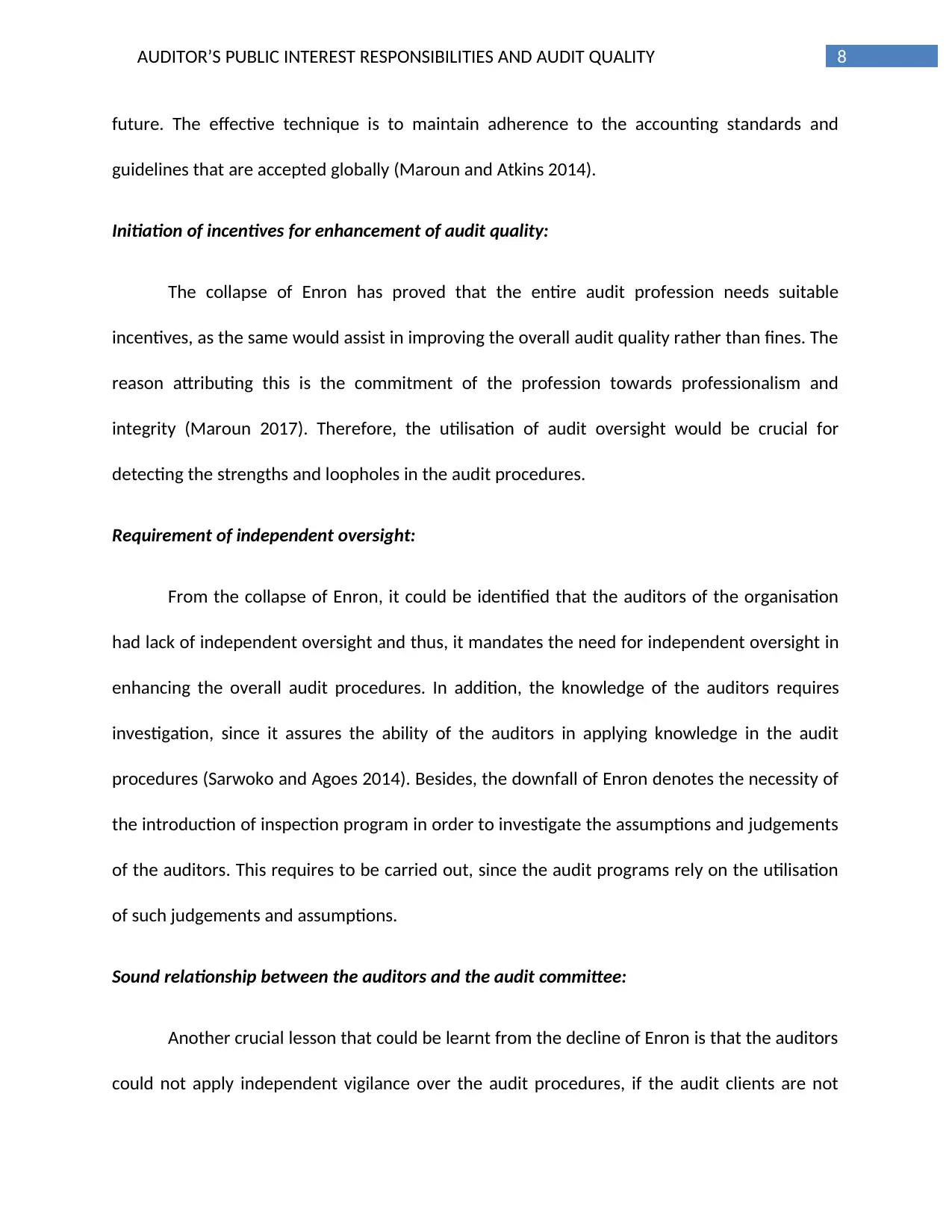
8AUDITOR’S PUBLIC INTEREST RESPONSIBILITIES AND AUDIT QUALITY
future. The effective technique is to maintain adherence to the accounting standards and
guidelines that are accepted globally (Maroun and Atkins 2014).
Initiation of incentives for enhancement of audit quality:
The collapse of Enron has proved that the entire audit profession needs suitable
incentives, as the same would assist in improving the overall audit quality rather than fines. The
reason attributing this is the commitment of the profession towards professionalism and
integrity (Maroun 2017). Therefore, the utilisation of audit oversight would be crucial for
detecting the strengths and loopholes in the audit procedures.
Requirement of independent oversight:
From the collapse of Enron, it could be identified that the auditors of the organisation
had lack of independent oversight and thus, it mandates the need for independent oversight in
enhancing the overall audit procedures. In addition, the knowledge of the auditors requires
investigation, since it assures the ability of the auditors in applying knowledge in the audit
procedures (Sarwoko and Agoes 2014). Besides, the downfall of Enron denotes the necessity of
the introduction of inspection program in order to investigate the assumptions and judgements
of the auditors. This requires to be carried out, since the audit programs rely on the utilisation
of such judgements and assumptions.
Sound relationship between the auditors and the audit committee:
Another crucial lesson that could be learnt from the decline of Enron is that the auditors
could not apply independent vigilance over the audit procedures, if the audit clients are not
future. The effective technique is to maintain adherence to the accounting standards and
guidelines that are accepted globally (Maroun and Atkins 2014).
Initiation of incentives for enhancement of audit quality:
The collapse of Enron has proved that the entire audit profession needs suitable
incentives, as the same would assist in improving the overall audit quality rather than fines. The
reason attributing this is the commitment of the profession towards professionalism and
integrity (Maroun 2017). Therefore, the utilisation of audit oversight would be crucial for
detecting the strengths and loopholes in the audit procedures.
Requirement of independent oversight:
From the collapse of Enron, it could be identified that the auditors of the organisation
had lack of independent oversight and thus, it mandates the need for independent oversight in
enhancing the overall audit procedures. In addition, the knowledge of the auditors requires
investigation, since it assures the ability of the auditors in applying knowledge in the audit
procedures (Sarwoko and Agoes 2014). Besides, the downfall of Enron denotes the necessity of
the introduction of inspection program in order to investigate the assumptions and judgements
of the auditors. This requires to be carried out, since the audit programs rely on the utilisation
of such judgements and assumptions.
Sound relationship between the auditors and the audit committee:
Another crucial lesson that could be learnt from the decline of Enron is that the auditors
could not apply independent vigilance over the audit procedures, if the audit clients are not
⊘ This is a preview!⊘
Do you want full access?
Subscribe today to unlock all pages.

Trusted by 1+ million students worldwide
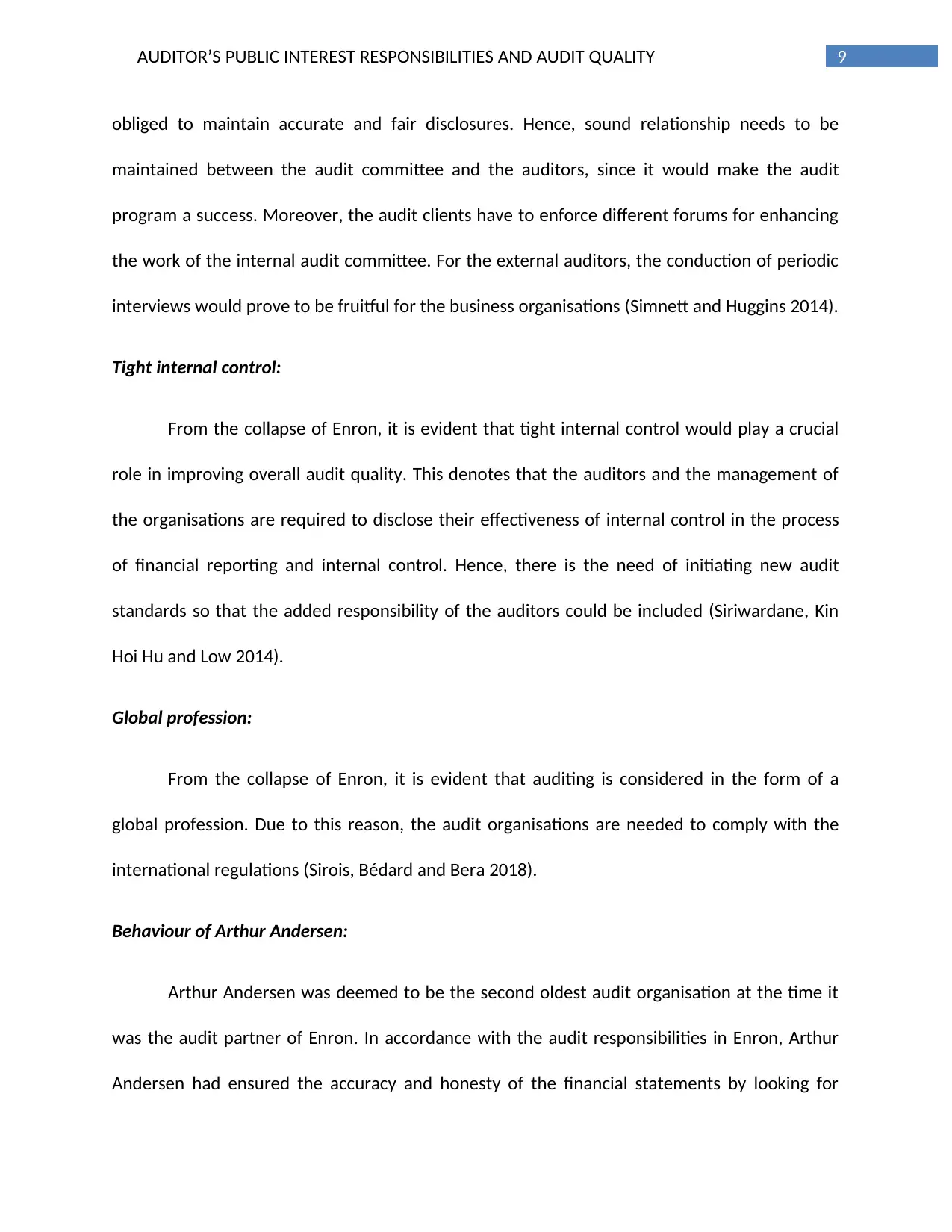
9AUDITOR’S PUBLIC INTEREST RESPONSIBILITIES AND AUDIT QUALITY
obliged to maintain accurate and fair disclosures. Hence, sound relationship needs to be
maintained between the audit committee and the auditors, since it would make the audit
program a success. Moreover, the audit clients have to enforce different forums for enhancing
the work of the internal audit committee. For the external auditors, the conduction of periodic
interviews would prove to be fruitful for the business organisations (Simnett and Huggins 2014).
Tight internal control:
From the collapse of Enron, it is evident that tight internal control would play a crucial
role in improving overall audit quality. This denotes that the auditors and the management of
the organisations are required to disclose their effectiveness of internal control in the process
of financial reporting and internal control. Hence, there is the need of initiating new audit
standards so that the added responsibility of the auditors could be included (Siriwardane, Kin
Hoi Hu and Low 2014).
Global profession:
From the collapse of Enron, it is evident that auditing is considered in the form of a
global profession. Due to this reason, the audit organisations are needed to comply with the
international regulations (Sirois, Bédard and Bera 2018).
Behaviour of Arthur Andersen:
Arthur Andersen was deemed to be the second oldest audit organisation at the time it
was the audit partner of Enron. In accordance with the audit responsibilities in Enron, Arthur
Andersen had ensured the accuracy and honesty of the financial statements by looking for
obliged to maintain accurate and fair disclosures. Hence, sound relationship needs to be
maintained between the audit committee and the auditors, since it would make the audit
program a success. Moreover, the audit clients have to enforce different forums for enhancing
the work of the internal audit committee. For the external auditors, the conduction of periodic
interviews would prove to be fruitful for the business organisations (Simnett and Huggins 2014).
Tight internal control:
From the collapse of Enron, it is evident that tight internal control would play a crucial
role in improving overall audit quality. This denotes that the auditors and the management of
the organisations are required to disclose their effectiveness of internal control in the process
of financial reporting and internal control. Hence, there is the need of initiating new audit
standards so that the added responsibility of the auditors could be included (Siriwardane, Kin
Hoi Hu and Low 2014).
Global profession:
From the collapse of Enron, it is evident that auditing is considered in the form of a
global profession. Due to this reason, the audit organisations are needed to comply with the
international regulations (Sirois, Bédard and Bera 2018).
Behaviour of Arthur Andersen:
Arthur Andersen was deemed to be the second oldest audit organisation at the time it
was the audit partner of Enron. In accordance with the audit responsibilities in Enron, Arthur
Andersen had ensured the accuracy and honesty of the financial statements by looking for
Paraphrase This Document
Need a fresh take? Get an instant paraphrase of this document with our AI Paraphraser
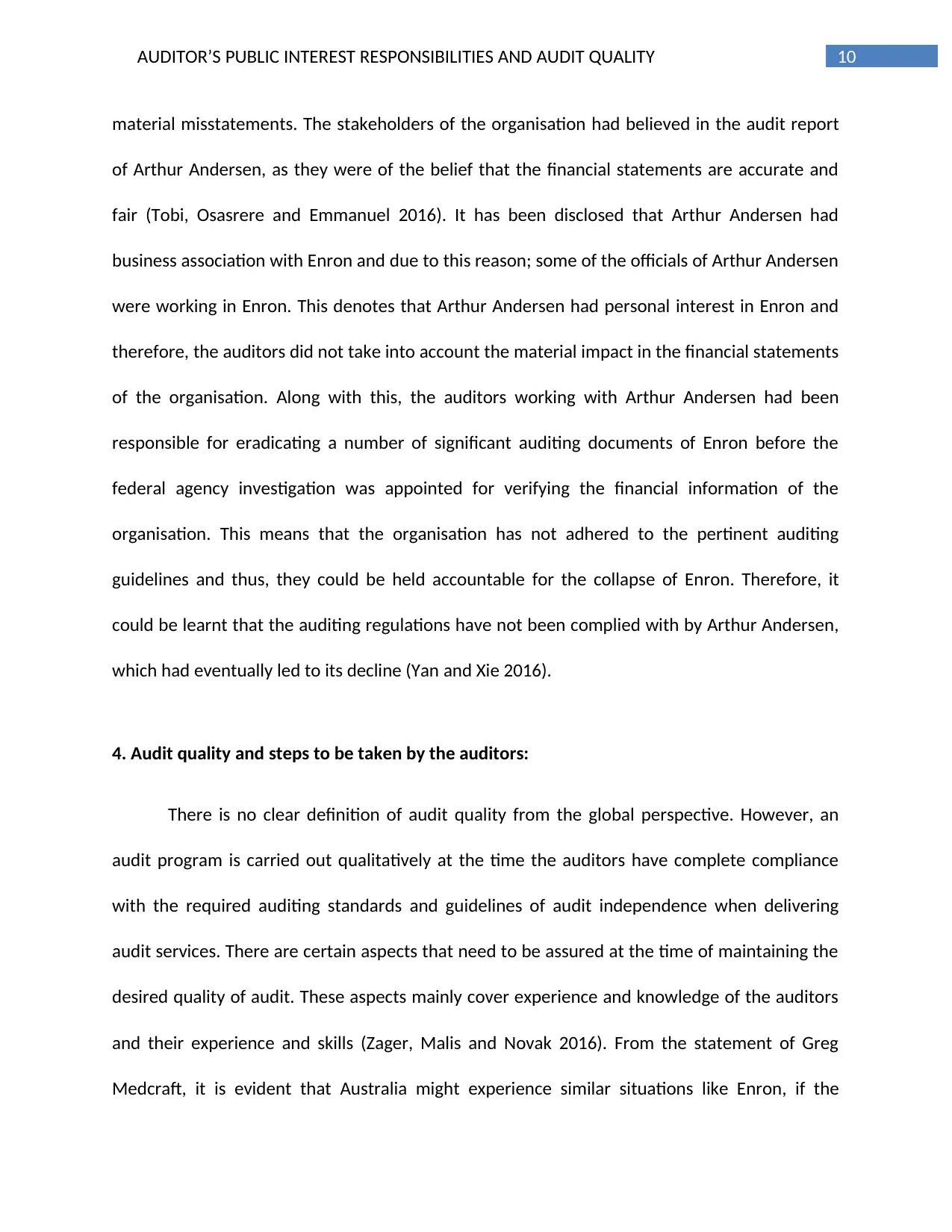
10AUDITOR’S PUBLIC INTEREST RESPONSIBILITIES AND AUDIT QUALITY
material misstatements. The stakeholders of the organisation had believed in the audit report
of Arthur Andersen, as they were of the belief that the financial statements are accurate and
fair (Tobi, Osasrere and Emmanuel 2016). It has been disclosed that Arthur Andersen had
business association with Enron and due to this reason; some of the officials of Arthur Andersen
were working in Enron. This denotes that Arthur Andersen had personal interest in Enron and
therefore, the auditors did not take into account the material impact in the financial statements
of the organisation. Along with this, the auditors working with Arthur Andersen had been
responsible for eradicating a number of significant auditing documents of Enron before the
federal agency investigation was appointed for verifying the financial information of the
organisation. This means that the organisation has not adhered to the pertinent auditing
guidelines and thus, they could be held accountable for the collapse of Enron. Therefore, it
could be learnt that the auditing regulations have not been complied with by Arthur Andersen,
which had eventually led to its decline (Yan and Xie 2016).
4. Audit quality and steps to be taken by the auditors:
There is no clear definition of audit quality from the global perspective. However, an
audit program is carried out qualitatively at the time the auditors have complete compliance
with the required auditing standards and guidelines of audit independence when delivering
audit services. There are certain aspects that need to be assured at the time of maintaining the
desired quality of audit. These aspects mainly cover experience and knowledge of the auditors
and their experience and skills (Zager, Malis and Novak 2016). From the statement of Greg
Medcraft, it is evident that Australia might experience similar situations like Enron, if the
material misstatements. The stakeholders of the organisation had believed in the audit report
of Arthur Andersen, as they were of the belief that the financial statements are accurate and
fair (Tobi, Osasrere and Emmanuel 2016). It has been disclosed that Arthur Andersen had
business association with Enron and due to this reason; some of the officials of Arthur Andersen
were working in Enron. This denotes that Arthur Andersen had personal interest in Enron and
therefore, the auditors did not take into account the material impact in the financial statements
of the organisation. Along with this, the auditors working with Arthur Andersen had been
responsible for eradicating a number of significant auditing documents of Enron before the
federal agency investigation was appointed for verifying the financial information of the
organisation. This means that the organisation has not adhered to the pertinent auditing
guidelines and thus, they could be held accountable for the collapse of Enron. Therefore, it
could be learnt that the auditing regulations have not been complied with by Arthur Andersen,
which had eventually led to its decline (Yan and Xie 2016).
4. Audit quality and steps to be taken by the auditors:
There is no clear definition of audit quality from the global perspective. However, an
audit program is carried out qualitatively at the time the auditors have complete compliance
with the required auditing standards and guidelines of audit independence when delivering
audit services. There are certain aspects that need to be assured at the time of maintaining the
desired quality of audit. These aspects mainly cover experience and knowledge of the auditors
and their experience and skills (Zager, Malis and Novak 2016). From the statement of Greg
Medcraft, it is evident that Australia might experience similar situations like Enron, if the
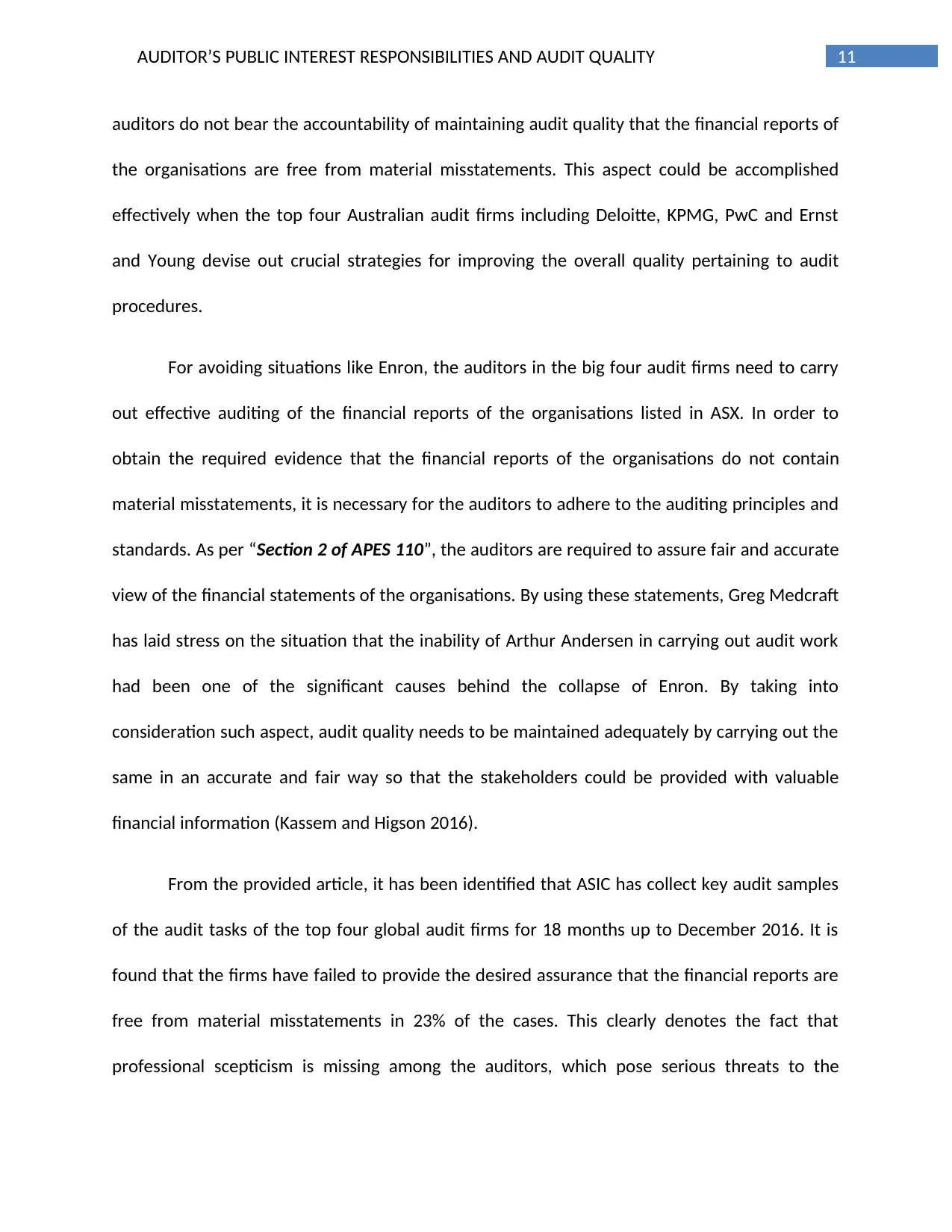
11AUDITOR’S PUBLIC INTEREST RESPONSIBILITIES AND AUDIT QUALITY
auditors do not bear the accountability of maintaining audit quality that the financial reports of
the organisations are free from material misstatements. This aspect could be accomplished
effectively when the top four Australian audit firms including Deloitte, KPMG, PwC and Ernst
and Young devise out crucial strategies for improving the overall quality pertaining to audit
procedures.
For avoiding situations like Enron, the auditors in the big four audit firms need to carry
out effective auditing of the financial reports of the organisations listed in ASX. In order to
obtain the required evidence that the financial reports of the organisations do not contain
material misstatements, it is necessary for the auditors to adhere to the auditing principles and
standards. As per “Section 2 of APES 110”, the auditors are required to assure fair and accurate
view of the financial statements of the organisations. By using these statements, Greg Medcraft
has laid stress on the situation that the inability of Arthur Andersen in carrying out audit work
had been one of the significant causes behind the collapse of Enron. By taking into
consideration such aspect, audit quality needs to be maintained adequately by carrying out the
same in an accurate and fair way so that the stakeholders could be provided with valuable
financial information (Kassem and Higson 2016).
From the provided article, it has been identified that ASIC has collect key audit samples
of the audit tasks of the top four global audit firms for 18 months up to December 2016. It is
found that the firms have failed to provide the desired assurance that the financial reports are
free from material misstatements in 23% of the cases. This clearly denotes the fact that
professional scepticism is missing among the auditors, which pose serious threats to the
auditors do not bear the accountability of maintaining audit quality that the financial reports of
the organisations are free from material misstatements. This aspect could be accomplished
effectively when the top four Australian audit firms including Deloitte, KPMG, PwC and Ernst
and Young devise out crucial strategies for improving the overall quality pertaining to audit
procedures.
For avoiding situations like Enron, the auditors in the big four audit firms need to carry
out effective auditing of the financial reports of the organisations listed in ASX. In order to
obtain the required evidence that the financial reports of the organisations do not contain
material misstatements, it is necessary for the auditors to adhere to the auditing principles and
standards. As per “Section 2 of APES 110”, the auditors are required to assure fair and accurate
view of the financial statements of the organisations. By using these statements, Greg Medcraft
has laid stress on the situation that the inability of Arthur Andersen in carrying out audit work
had been one of the significant causes behind the collapse of Enron. By taking into
consideration such aspect, audit quality needs to be maintained adequately by carrying out the
same in an accurate and fair way so that the stakeholders could be provided with valuable
financial information (Kassem and Higson 2016).
From the provided article, it has been identified that ASIC has collect key audit samples
of the audit tasks of the top four global audit firms for 18 months up to December 2016. It is
found that the firms have failed to provide the desired assurance that the financial reports are
free from material misstatements in 23% of the cases. This clearly denotes the fact that
professional scepticism is missing among the auditors, which pose serious threats to the
⊘ This is a preview!⊘
Do you want full access?
Subscribe today to unlock all pages.

Trusted by 1+ million students worldwide
1 out of 19
Related Documents
Your All-in-One AI-Powered Toolkit for Academic Success.
+13062052269
info@desklib.com
Available 24*7 on WhatsApp / Email
![[object Object]](/_next/static/media/star-bottom.7253800d.svg)
Unlock your academic potential
Copyright © 2020–2026 A2Z Services. All Rights Reserved. Developed and managed by ZUCOL.





